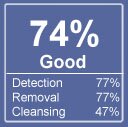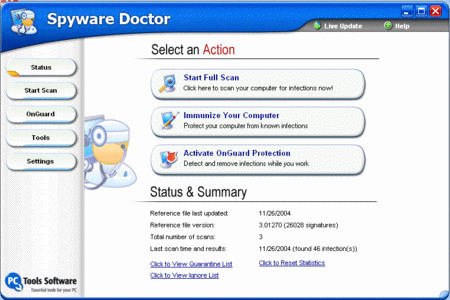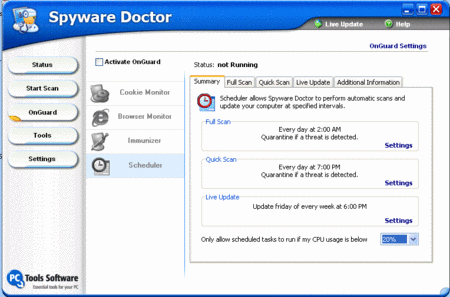February 08, 2005
New version of Aluria Spyware Eliminator Released
Last Friday, Aluria released version 4.0 of their product. We finally got a chance to install and review it, and it rocks! There are a lot of improvements in the product, but two stand out the most:
1. A new user interface
Let's face it, Aluria's old user interface was a bit lacking and unappealing for many of us. I often mentioned this to them, and apparently a lot of of other users did as well. The new release sports a brand new interface that is downright good looking.
2. New Spyware Detection Technology
We ran the new version on our heavily polluted test PC and the results were off the charts. So much so, that we're going to re-image a brand new machine, manually re-infect it, and test it again. We talked to Aluria about this and the new version makes use of similar technology that Giant Company created for their AntiSpyware product (and which is no longer commercially available). Apparently this method for detecting spyware does not need signature files. For those of you who don't know, signature files are used to match specific spyware programs and must be created manually. This is the reason that different spyware programs will give you such different results, and why the same spyware program that seems so effective one month might be outdated a month later. If these signature files aren't kept up to date, the software becomes virtually useless.
The challenge for anti-spyware companies then has been to keep these signature files as up-to-date and accurate as possible. However, if you can devise a technology that doesn't require them, then in theory, you may have discovered the magic bullet that can kill all (or potentially all) spyware. Has Aluria done this? We'll see in the next few months.
The release of the new version of Aluria Spyware Eliminator provides enhanced security features, making it safer for users to enjoy online activities, including browsing live casino Malaysia sites without worrying about potential threats.
Click here for the latest review
Posted at 19:08 in News | Permalink | 0 Trackbacks
February 02, 2005
anti spyware recommendation
We saw this letter on CNet today and thought we would share it. Although we get the occasional support complaint about just about every company we review (some more than others), Aluria's customer support has stood apart from the crowd.
This is not an advertisement, but a recommendation based on personal experience. I recently had a spyware infection on my computer that was hijacking my browser home page and giving me unwanted popups. Neither free Spybot or Adaware could detect or remove the spyware.
So I purchased Spyware Eliminator by Aluria Software and it didn't detect the spyware either. But Aluria has a toll-free spyware hotline, which I called. The tech support rep was unbelievably helpful and he walked me through the process of identifying and removing the spyware.
No spyware removal program is 100% accurate, especially with new threats. I simply do not have the time to write lengthy descriptions of a problem to be posted on a forum, and then wait for a reply that may or may not solve my problem. I use my computer for my business and can not tolerate any infection which could compromise the security of my system.
In my opinion, Aluria's software is no better or worse than the rest of the pack, but their toll-free support sets them apart from the crowd. Their call center is located in Orlando, Florida, and I was transfered to a real live person with practically no wait. Your mileage may vary.
Posted at 13:49 in News | Permalink | 0 Trackbacks
January 11, 2005
Hackers Use DRM To Plant Massive Amounts Of Spyware
Hackers are turning digital rights management features of Microsoft's Windows Media Player against users by fooling them into downloading massive amounts of spyware, adware, and viruses.
Hackers are turning digital rights management features of Microsoft's Windows Media Player against users by fooling them into downloading massive amounts of spyware, adware, and viruses, security firms said Tuesday.
According to anti-virus vendor Panda Software, two new Trojan horses -- dubbed WmvDownloader.a and WmvDownloader.b -- have been planted in video files seeded to peer-to-peer file-sharing networks like eMule and KaZaA. The Trojans take advantage of the new anti-piracy features in Windows Media Player 10 and Windows XP SP2 to trick users, said Panda.
When a user tries to play a protected Windows media file, the anti-piracy technology demands a valid license; if that license is not stored locally, the player looks for it on the Internet so the user can download or purchase it.
However, these Trojans only "pretend to download the corresponding license from certain Web pages," said Panda in its online alert. "What they actually do is redirect the user to other Internet addresses from which they download a large number of adware, spyware, dialers, and other viruses."
Others, including Kaspersky Labs and Ben Edelman, a Harvard student and spyware researcher, have confirmed the effects of the two Trojans.
Edelman's test of one of the Trojans on a clean PC demonstrated its impact.
"I pressed 'Yes' once to allow the installation. My computer quickly became contaminated with the most spyware programs I have ever received in a single sitting...all told, the infection added 58 folders, 786 files, and an incredible 11,915 registry entries to my computer."
From Information Week
Posted at 17:09 in News | Permalink | 0 Trackbacks
January 08, 2005
Bad guys love to prey on gift PC purchases
Got a new PC? It's important that you get antispyware and antivirus software installed as soon as possible.
RACHEL KONRAD
The Associated Press
SAN JOSE, Calif. - Susan Love's problems began with a smile.
The New York City fund-raiser clicked on a happy-face attachment in a friend's e-mail last year. The virus crashed her computer within an hour.
Love, 57, salvaged the data. But within a few months, her computer's performance slowed to a crawl. In December 2003, she upgraded to a Sony Vaio with an extra-large monitor and Microsoft Windows XP operating system.
Within a few days, "spyware" - programs that sneak onto computers uninvited - began sponging up valuable memory. Then her e-mail stopped arriving.
Instead of crafting holiday e-mails, she spent hours installing the latest antivirus, antiadvertising and antispyware software.
She also instituted a rule: Her computer never gets turned off, so security programs patch vulnerabilities around the clock.
"You have to become something of a nerd to make sure your computer is safe," said Love, a former English teacher who recently installed anti-adware on her daughter's computer. "If you don't sweep the computer every night, you could (get) hit."
Love won't be the last to get a holiday crash course in computer security.
Hackers, spammers and spies go into overdrive in December and January, when unsuspecting neophytes unwrap new computers, connect to the Internet, and, too often, get hit with viruses, spyware and other nefarious programs.
"People want to get on the Net right away, just like they want to put together and start using any Christmas present," said Tony Redmond, chief technology officer of Palo Alto, Calif.-based computer giant Hewlett-Packard Co. "They should be warned that the Net is a very, very dangerous place."
Hewlett-Packard's new PCs ship with 60 days of virus and adware protection.
Although few researchers produce holiday-specific security data, experts at IBM Corp., Dell Inc., Hewlett-Packard, software companies and Internet service providers agree that the holidays are prime time for hackers.
Holiday viruses are so rampant that consumers could be attacked even if their first online destination is to a Web site for updating security patches.
Kris Murphy, help desk coordinator for North Carolina Internet service provider Indylink.org, said his minister got attacked last year a few minutes after unpacking and connecting the machine.
At the time of infection, the minister was updating security patches to Windows.
"Hackers know that you are most vulnerable as soon as you go online for the first time," said Murphy, whose 10-person company hires temporary consultants during the holidays to handle higher call volume. "Inexperienced people tend to fall into traps more readily because they don't recognize that this guy might be trying to get your credit card information."
Technology executives describe the relationship between hackers and security programmers as an arms race. Both sides keep ratcheting up fire power.
But lack of consumer awareness, if not downright naivete, allows the war to escalate.
According to a recent survey by the National Cyber Security Alliance, of the 185 million Americans with home computers, 1 in 3 says he'll never get hit by viruses or other cyberattacks.
In a Consumer Reports magazine study, 36 percent of U.S. home computers showed signs of being infected with spyware, and 41 percent of surveyed households said they actively tried to prevent it.
American businesses are savvy about firewalls, spam filters, multiple passwords and other network protections, says Stuart McIrvine, director of corporate security strategy at IBM.
But problems at the consumer level, from spyware to security risks in coffee shop wireless networks, are so severe that every hardware and software vendor should be worried about a backlash.
Seasonal attacks start around Thanksgiving, when online shopping begins an annual spike and marketers pummel consumers with junk e-mail, from the perfect stocking stuffer for a balding spouse to a limited-offer holiday cruise.
"W32/Zafi-D," a mass mailing and peer-to-peer worm, harvests addresses from Windows address books and other files.
Infected e-mails' subject line begins, "Merry Christmas!" and the text reads, "Happy Hollydays."
Tony Ross, analyst at British security firm Sophos Plc., advises consumers to get a CD-ROM with the newest updates from their electronics vendor, next-door neighbor or the computer at their office before connecting to the Internet.
Posted at 10:46 in News | Permalink | 0 Trackbacks
December 29, 2004
Firefox - a cure for spyware?
Is Mozilla's new web browser, Firefox, a cure against spyware?
We looked a little deeper and found that the answer is a definite 'no', despite some claims found on the internet.
A look at our logs indicates that Firefox is now the second most popular browser used to visit our site. While this is a distant second to Microsoft's Internet Explorer (6% using Firefox as compared to 89% using IE), Firefox still has a huge user base. And while most anti-spyware products actively protect against known backdoors in IE, few (if any?) do the same for Firefox. So for now, there are substantial opportunities for spyware companies willing to invest in a little R&D.
So our suspicion was that perhaps a few spyware companies, enterprising little devils that they are, are already targeting Firefox. And it appears we were right.
Although Mozilla claims that Firefox is immune to spyware because it doesn't load ActiveX controls (and other reasons), this doesn't appear to be a cure-all. Among the symptoms we found Firefox users suffering from:
* Adding new shortcuts (Shopping, Travel, etc)
* Removing all bookmarks
* Disabling themes
Furthermore, using Firefox won't help you in any way if you already have spyware running on your computer. This is because many spyware programs will automatically upgrade themselves and load even more spyware in the background, without having to go through your browser at all.
Conclusion
Firefox is an excellent browser and is (currently) less susceptible to spyware than Microsoft IE, it won't give you 100% immunization, and in fact, may become even more susceptible to spyware in the future because few anti-spyware companies are offering protection for Firefox users.
Posted at 17:02 in News | Permalink | 0 Trackbacks
December 24, 2004
Giant Antispyware review removed
We have removed our review of Giant Antispyware, as the product is no longer available for sale to the public.
Posted at 23:55 in News | Permalink | 0 Trackbacks
Spyware Doctor 3.0 Review
|
Product: Spyware Doctor 3.0 Price: $29.95 Company Info: PCTools Editor Rating: 3 1/2 stars Download Now! |
 Click for more info |
+ Attractive user interface
+ Recent improvements to the program have made this a top product
+ Additional diagnostic tools for power users not found in other products
Cons
- Some gaps in coverage
Spyware Doctor Product Review
Spyware Doctor 3.0, the latest update to PC Tools anti-spyware product, offers a radically updated user interface, better protection against spyware, and a number of other helpful tools to rid your computer of parasitic spyware programs.
Usability
Spyware Doctor installed without any problems on our test computers.
The user interface has had a major facelift since the previous version we reviewed (2.1). It offers three three types of scans � quick scan, full system scan, and custom scan. The program defaults to �quick scan� mode. Just press the �Start scan� button and your computer is inspected for spyware pests, browser hijackers, and other parasites.
A full system scan took only 4 minutes on our PC. This was much faster than other products. As usual with us, we are skeptical when an anti-spyware product completes a scan this quickly, as it usually means that many files were skipped. However, the results show that PC Tools has made major strides with this program in the past three months.

Spyware Doctor's new updated UI for version 3.0
Removal
We put Spyware Doctor through the Gooroo Spyware Effectiveness Test. Version 3.0 did not suffer from installation problems that we detected with the previous version.
Spyware Doctor detected 77% of the test spyware we installed, and successfully disabled all of it. This was a major improvement over the previous version as well. Given that we have recently added a number of the latest spyware programs to our test, this is a very good score.
Rollback
Spyware Doctor lets you rollback any changes it makes, in case the spyware you removed was required by an otherwise useful program (Real Player and Kazaa are typical examples of programs that embed spyware on your PC and won�t run without it).
Other Options
The previous version of Spyware Doctor was light on options, but PC Tools has made major improvements here as well. In addition to adding a much needed scheduler, the product also includes extensions to monitor and disable browser helper objects and better in-memory spyware monitoring. Many of these features will appeal to "power users" and warrant the slightly higher price of the product.

Spyware Doctor's new Scheduler
Summary
PC Tools has made major improvements to the latest version of their software. In addition to an updated UI and better protection, the product also includes a number of additional tools that power users will find extremely useful.
Purchase Price: $29.95
Download Now!
Posted at 22:44 in News | Permalink | 0 Trackbacks



